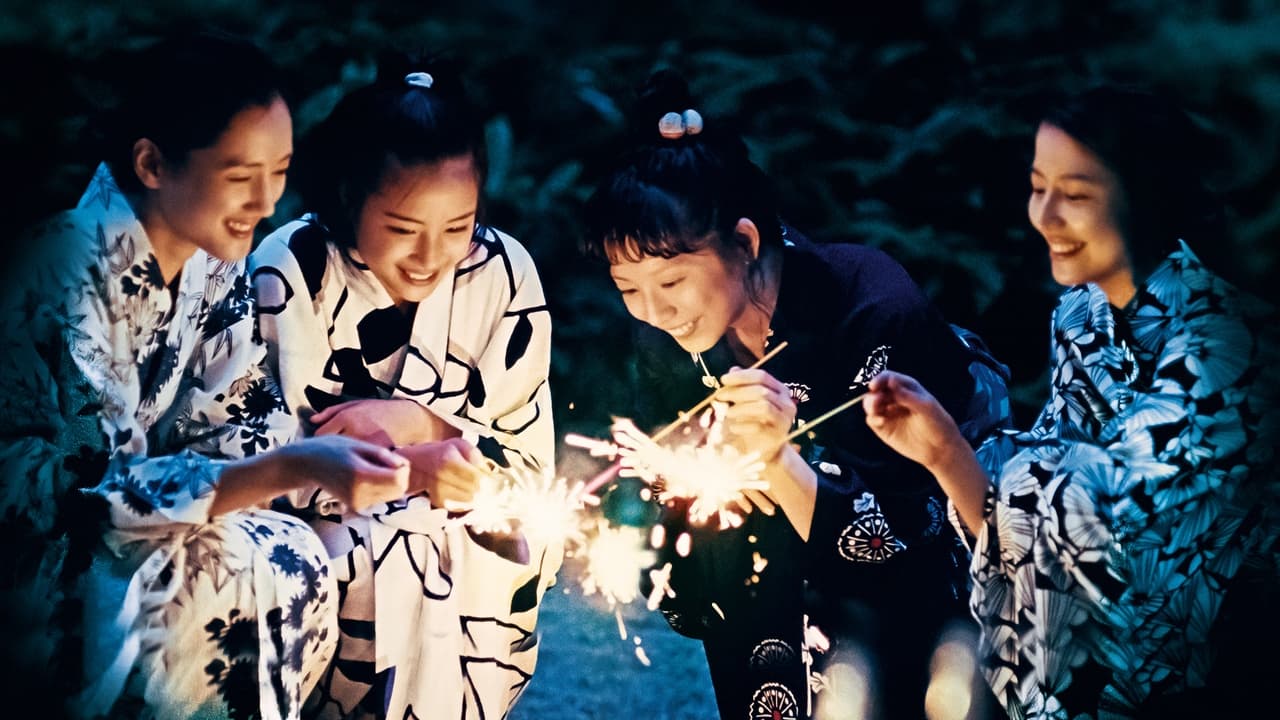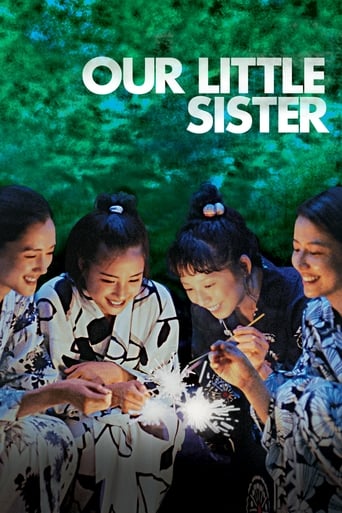

Like so many foreign films, this is devoid of special effects, tiresome action sequences, gratuitous sex and violence-- just a lovely little gem that truly makes you feel at its conclusion like you were immersed in another culture for awhile. You forget that these people are actors-- it's more like watching real sisters in real life. One also comes away wanting to visit rural Japan-- it was refreshing to see more of the countryside as opposed to the large cities with all the congestion and crowding. All in all, if you are looking for a movie that leaves you feeling all warm and fuzzy at its conclusion, look no further-- "Our Little Sister" is an excellent film and I highly recommend it!
... View MorePut aside a part of your clichés about Japan, the director Hirokazu Kore-eda immerses the viewer in the intimacy of three sisters whose personalities are way different. Their kindness leads them to welcome their half-sister whose existence was ignored by them. The photography, bright and refined, provides the movie with a goodwill whose secret is only kept by Japanese productions. Way more than a simple "feel good movie", "Our little sister" never falls into the pathos despite situations that would easily lend to it. Not dramatic nor a comedy, it's the movie's neutrality that is striking : scenes follow one after another without having a single impact on each other and yet, the camera's eye leads us to become infatuated with those four sisters that are learning to be happy together, each of them bounded by her own intrigue in the background. If the message can seem a little bit too bright, sometimes flirting with the gullible, we have no problem embracing this naivety, like during this beautiful biking scene where the blooming sakuras pass before our eyes. Full review on our blog Los Indiscretos : https://losindiscretos.org/english/our-little-sister-2015-hirokazu- koreeda/
... View MoreSo why does Our Little Sister open with a shot of a woman's feet and pan up her bare legs to reveal her in bed with her lover, presumably naked under the blanket? This very sensual image is completely out of step with the film's quiet, meditative story of three sisters adopting the 13-year-old half-sister they meet at their father's funeral. The film pays a lot of attention to the women's legs and feet. The woman in bed is Yoshino, 22, who gives money to her wastrel lover, drinks heavily and has slept around. Later she prominently strips off her black stockings in the right foreground. All four sisters flash their legs in all the long and medium shots, an openness that contrasts to the scenes in which the traditional kimonos conceal their legs entirely. (In a culinary parallel to this movement away from tradition, all the chopstick eating scenes are joined by one scene where spoons are used for a curry.)In a scene of girlish mischief Chika,19, paints 13-year-old Suzu's toenails. Despite her youth, of the three senior sisters Chika has the healthiest and most stable affair, with the adventurous colleague at the sporting goods store. Despite having lost six toes to frostbite he is a full man, with the freest commitment both to his lover and life. The three sisters have been living in their grandmother's house since their mother abandoned them, their father having run off with his mistress (Suzu's mother). Nurse Sachi, 29, has been raising both sisters and takes the initiative in rescuing Suzu from having to live with her stepmother, their father's third wife, after his funeral. The father's death, Suzu's arrival and the tensions raised by their mother's callous visit force the sisters to confront their past and to take more conscious control over their lives. They become aware of how their parents' abandonment has been influencing their behaviour. After her lover dumps Yoshino she controls her instinct to please men at all costs, as if pleasing them would salve her irrational guilt for not having better pleased her father. Her new bank job with a compassionate male boss leads her to a new self-respect and responsibility. Young Suzu slips easily into her life with the sisters, her school, the co-ed soccer team, but she is unable to talk to her sisters about their father. Drunk and unconscious she calls her father an idiot. but through the family's experience is freed to express her suppressed anger at her mother's neglect. She begins to ease into a relationship with a class- and team-mate, in whom she first confides her reticence. Similarly the sober eldest sister, Sachi, reminded of the destructiveness and folly of her father's self-indulgence, refuses to join her paediatrician lover's move to America, despite his promise to divorce his unstable wife for her. Sachi will stay with her doubled responsibilities of guiding her sisters and serving her dying patients in the new palliative care ward.This cycle of life and death plays out against the seasons. There are shots of stunning autumnal glory. The harvesting of the plums and the mixed delights of plum swine recur in the narrative. In their make-up scene Sachi brings their mother a jug of their recent plum wine and the last jug of their grandmother's. Suzu's promising swain bicycles her through a tunnel of refulgent cherry blossoms. An old restaurant owner takes a dying woman for a last look at those blossoms —and offers to tell Suzu stories about her father. That dying woman is the sisters' mother surrogate. They have patronized her diner since their infancy. Bankrupted by her own brother's calling in a loan, the woman treasures the — now four — sisters as children she never had. Now dying, she finds ease in Sachi's hospital care and the attentions of the man who ran his own diner — and continues to serve her recipes. The surrogate mother's funeral provides an emotional climax in place of the complications their mother's death and funeral would have raised.In the last scene the four sisters leave that funeral to walk along the beach. They cavort together at the edge of the tide, still in their funeral blacks — but they don't take off their shoes. From all the film beach frolics we've watched we expect they would. Keeping on their shoes — even their heels — becomes an indication of their new self-knowledge, self-control and discipline. Legs, feet, they're an emblem of our grounding, the base on which we stand and move. The framing shots — naked legs and heels kept on at the beach — encapsulate the women's growth from the impulses of a sensual, unexamined life to the maturity of self-control and self- respect. The opening scene leads us to expect yet another story of sexual awakening. Instead we get what the sisters blossom into, the primacy of family connection and responsible, giving love.
... View MoreMade an account just to review this movie. What a boring, boring, BORING movie. I see a lot of foreign films (mother-tongue Tamil) and this is one of the worst non-Tamil, non-English movies I've ever seen, Oh sure we can go on and on about the cinematography, the acting (gag) and all sorts of technical details BUT, at the core of the film, the story itself is bad. It is so bad. So some girl comes to live with her 3 other sisters after her dad dies. Fair enough. But go somewhere with it. Literally the most mundane and banal things happen throughout the movie. No drama, no tension, no nothing. Would have been vastly better if the girl was a completely amoral sociopath that rips apart the closely knit sisters. I would pay good money to watch that. Oh they're going shopping. No scallops! Gasp! What drama! Whatever will they do next? COOKING! CLEANING! WASHING! What a twist! Keeps you on the edge of your seat. I couldn't even finish this turd and that's a complete low for me. At least they made Japan look good. All these glowing critic reviews feels like a conspiracy. This movie is the definition of Oscar bait. Banal, trite and no kind of storytelling whatsoever. 1 / 10.
... View More